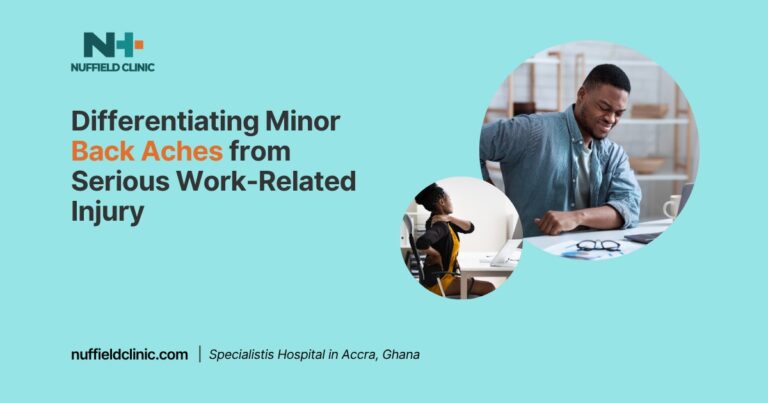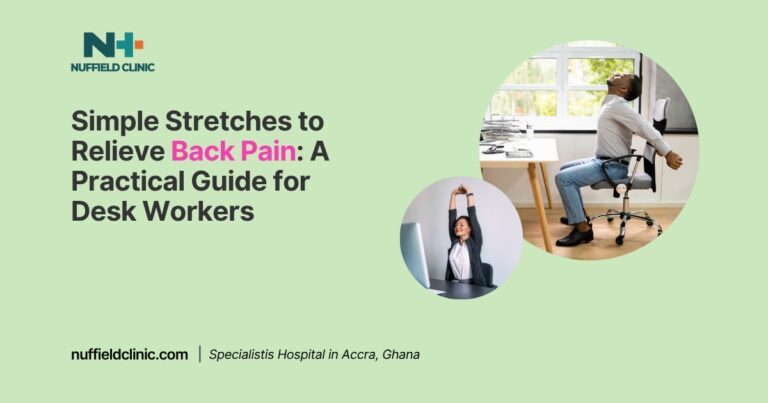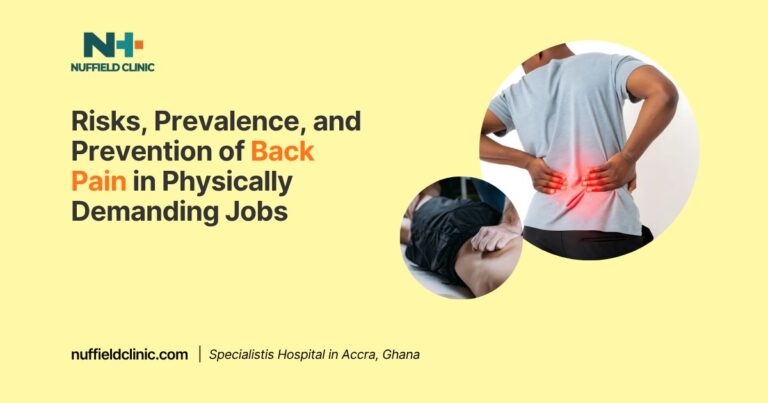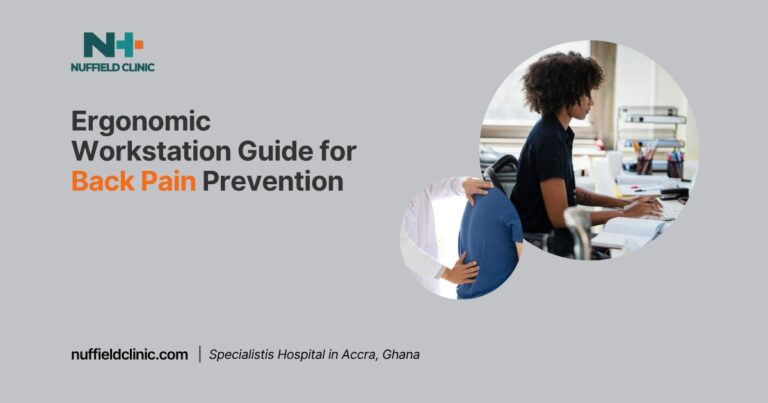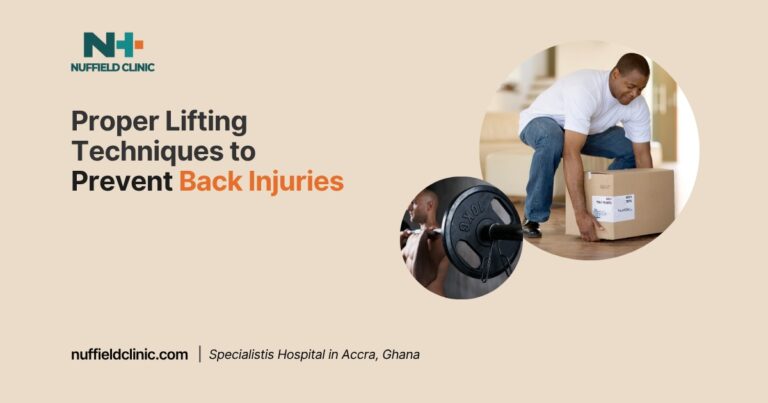Back Pain: Causes & Risk Factors in Ghana
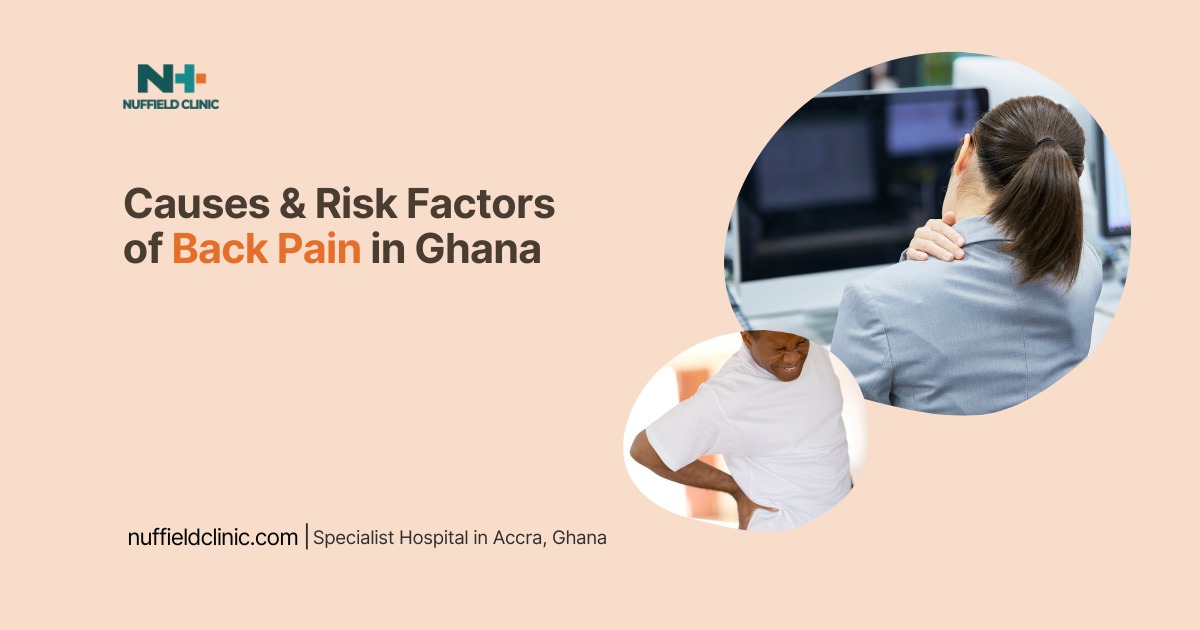
Back pain is one of the most common health complaints in Ghana today, cutting across age, profession, and lifestyle. From office workers spending long hours at their desks to farmers working in the fields, almost everyone has experienced some form of back discomfort. Unfortunately, many Ghanaians dismiss back pain as something that will “go away on its own,” only to face more serious complications later.
This article explores the main causes and risk factors of back pain in Ghana, backed by medical insights and real-life examples. If you understand what triggers back pain and how your lifestyle or work environment contributes, you can take steps to prevent it, manage it effectively, and seek professional help at the right time.
Poor Posture and Sedentary Lifestyle
One of the most overlooked causes of back pain is poor posture. In Accra, Kumasi, and other urban centres, many people spend long hours behind computers without ergonomic chairs or desks. Hunching over a laptop or sitting on plastic chairs for extended periods puts unnecessary strain on the spine.
A sedentary lifestyle also compounds the problem. Office jobs, long commutes, and the popularity of TV or phone scrolling in the evenings mean less movement for the spine and supporting muscles. Weak core muscles fail to support the lower back properly, leading to persistent pain.
Physically Demanding Work and Heavy Lifting
Outside the office, many Ghanaians engage in physically demanding jobs. Farmers, masons, traders, and porters (kayayei) regularly carry heavy loads. Improper lifting techniques, such as bending at the waist instead of the knees, cause spinal injuries and long-term pain.
Construction workers often lift cement bags weighing 50kg, while market women balance basins of tomatoes or yams on their heads. Over time, this repetitive strain weakens the spine and increases the risk of herniated discs and nerve compression.
The spine is not designed to withstand repeated heavy lifting without support. Education on safe lifting techniques and access to lifting aids could prevent many cases of back pain in Ghana.
Ageing and Natural Degeneration
As people age, the spine undergoes wear and tear. In Ghana, where healthcare access varies, many older adults live with untreated back pain caused by arthritis, degenerative disc disease, or osteoporosis.
With limited awareness about preventive care, most only seek medical help when the pain becomes severe. The result is late diagnoses and reduced quality of life.
Regular check-ups after the age of 40, combined with simple exercises like walking and stretching, can slow down spinal degeneration.
Accidents and Sports Injuries
Road traffic accidents remain a major public health issue in Ghana. Many survivors of road crashes suffer from back injuries, ranging from whiplash to spinal fractures. Similarly, young people who play football or engage in gym workouts without proper technique may strain their backs.
Gyms in Ghana are becoming more popular, but not all trainers focus on safe lifting forms. A young man deadlifting without supervision can easily injure his lower back and develop chronic pain.
Underlying Medical Conditions
Sometimes, back pain signals a deeper medical issue. Conditions such as scoliosis, sciatica, kidney infections, and even certain cancers can present with persistent back pain. Rheumatology experts in Ghana also highlight the link between autoimmune diseases and chronic spinal pain.
Unfortunately, due to self-medication culture, many Ghanaians rely on painkillers from pharmacies instead of consulting specialists. This delays treatment and can worsen the underlying condition.
Lifestyle Risk Factors
Beyond physical causes, lifestyle choices contribute heavily to back pain. Smoking reduces blood flow to spinal tissues, slowing healing. Excess body weight, a growing issue in urban Ghana, increases pressure on the lower spine. Poor sleeping positions, such as using thin or overly soft mattresses, also strain the back.
Stress and Mental Health
Stress is an underestimated factor in back pain. Tension in the body often manifests as tightness in the back and shoulders. In Ghana, financial pressures, work-related stress, and family responsibilities all contribute.
When mental health is not addressed, physical symptoms such as back pain persist despite treatment. A holistic approach combining medical care, physiotherapy, and stress management provides better results.
When to Seek Professional Help
Not all back pain requires hospital visits, but certain red flags should never be ignored. Seek professional help if:
- Pain persists for more than two weeks.
- You experience numbness, tingling, or weakness in the legs.
- Pain follows an accident or heavy fall.
- There is unexplained weight loss or fever alongside the pain.
In Ghana, poor posture, heavy lifting, ageing, and lifestyle choices remain the leading causes, but accidents and underlying health conditions also play a role. Understanding these causes and risk factors empowers you to take preventive steps, seek timely medical advice, and improve your quality of life.
If you are experiencing persistent back pain, don’t rely solely on over-the-counter painkillers. Speak to a physiotherapist, orthopaedic specialist, or visit a spine clinic near you for tailored solutions. Your back is central to your wellbeing; take care of it today.


